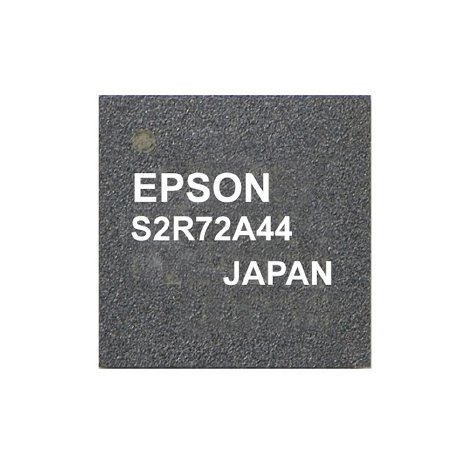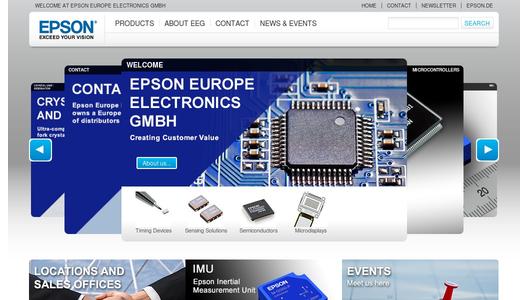The convenience of USB ports is making them a popular choice for automotive equipment such as car navigation systems. Epson's USB hub controllers for automotive applications, which the company first announced in 2009, meet the rigorous quality required by the automotive industry. They also provide best-in-class [3] transmission performance, achieving stable communications even with USB cables measuring five meters or longer. The ability to maintain stable, reliable communications over a long USB cable connecting a car navigation system in the front of a vehicle, for example, and a monitor or audio system in the rear has been a major selling point, and Epson's USB hub controllers are widely used by automotive electronics manufacturers.
Automotive electronics systems continue to proliferate, making it necessary for component suppliers to scale down the footprint and height of board-mounted components in order to conserve space. The tiny packages used for the S2R72A4 series were designed with this in mind. The 48-pin QFN package (7 mm x 7 mm) has an approximately 40% smaller footprint than that of Epson's 48-pin QFP package (9 mm x 9 mm). It is also only about 40% as high (1.0 mm compared to 1.7 mm).
[1] As of the end of June 2013, according to Epson research
[2] Compared to Epson's 48-pin QFP packages (S2R72A42F12, S2R72A43F12, S2R72A44F12).
[3] Best-in-class as of the end of June 2013, according to tests conducted by Epson, which evaluated transmission errors in various lengths of USB cables connected to a USB hub controller
Features of Epson's S2R72A4 series of USB hub controller ICs for automotive applications
1. Wide operating temperature range
-40 to 105 degrees Celsius
2. Automotive quality
- High reliability achieved by practicing a variety of quality control methods Design methodologies: FMEA, DFT, DFM, EMC, etc. Process control: FMEA, SPC, traceability based on special part numbers, etc. Testing/screening: All are burn-In.
- The 48-pin QFP packages (S2R72A42F12, S2R72A43F12, S2R72A44F12) are currently being tested for qualification under the automotive industry standard AEC-Q100.
1. Stable communications even with long USB cables
The ability to use long cables provides manufacturers of automotive electronics with greater design freedom and reduces development time.
2. Small package
48-pin QFN (S2R72A42F07, S2R72A43F07, S2R72A44F07): 7 mm x 7 mm
48-pin QFP (S2R72A42F12, S2R72A43F12, S2R72A44F12): 9 mm x 9 mm (including leads)
3. Multi-port support
Upstream port x 1
Downstream port x 4 (high-speed port x 2, full-speed port x 2)
4. Supports the locking in of USB full-speed mode
- The upstream port is locked in USB full-speed mode and can be used as a USB full-speed hub (USB high-speed non-supported hub).
- Can be locked in to USB full-speed even if the destination host supports USB high-speed, which is effective in improving EMI/EMC performance and reducing power consumption
5. Low-voltage operation
LVDD: 1.8 V (internal) HVDD: 3.3 V (USB unit)
For further details on Epson's USB hub controllers, please see the link below:
http://www.epson.jp/...
About Epson
Epson is a global innovation leader whose product lineup ranges from inkjet printers and printing systems, 3LCD projectors and industrial robots to sensors and other microdevices. Dedicated to exceeding the vision of its customers worldwide, Epson delivers customer value based on compact, energy-saving, and high-precision technologies in markets spanning enterprise and the home to commerce and industry.
Led by the Japan-based Seiko Epson Corporation, the Epson Group comprises more than 68,000 employees in 96 companies around the world, and is proud of its ongoing contributions to the global environment and the communities in which it operates.
http://global.epson.com/


